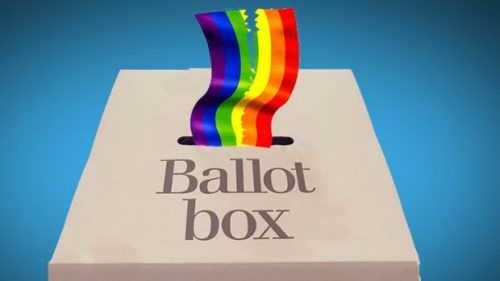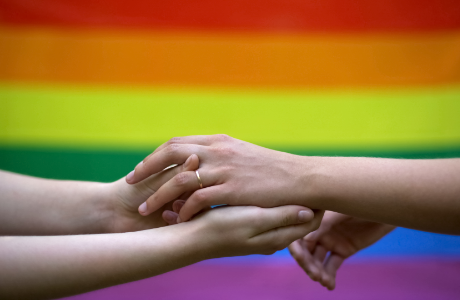Someone accused me on Facebook recently of “being quiet” on the issue of same-sex marriage. While that’s not been the case, I have chosen not to engage in the vitriolic rants and raves between Christians and LGBTI people.
It appears to me that some Christians are dug down in one trench and some LGBTI people in an opposite trench and they’re just shooting at one another. I’d like to declare a ceasefire – shooting at each other is achieving nothing other than causing hatred and anger to be stirred up – and the Christians should stop firing first! I can’t see anywhere in the Bible that teaches God sent His Son into the world to raise up a people to be the world’s moral police. In fact, He sent His Son for just the opposite of that – to bring peace, forgiveness, salvation, redemption, grace and new beginnings.
Firstly, let me clearly state my views on Biblical/Christian marriage. In Matthew 19 some religious leaders asked Jesus about marriage and divorce. In reply He took them right back to the beginning of the Book (Genesis 1:27; 5:2), “Haven’t you read … that at the beginning the Creator ‘made them male and female,’ and said, ‘For this reason a man will leave his father and mother and be united to his wife, and the two will become one flesh’? So they are no longer two, but one flesh. Therefore what God has joined together, let no one separate.” When you read the account of God’s creation of people you find that God created people in His image: “in the image of God He created him; male and female He created them.” It appears that God divided His nature between male and female so that the coming together of a man and a woman in marriage would be a coming together of the complete image of God hence “the two will become one.” No other human relationship can reflect the image of God in the way a heterosexual marriage can.
In Ephesians chapter five the apostle Paul speaks of marriage between a man and a woman as symbolising the relationship between Jesus and the church: “For this reason a man will leave his father and mother and be united to his wife, and the two will become one flesh.” This is a profound mystery—but I am talking about Christ and the church” (31-32). No other human relationship can reflect the connection between Jesus and the church in the way a heterosexual marriage can. On the basis of these – and other parts of the Bible – I believe the current definition of marriage, in the Australian Marriage Act, accurately reflects a Biblical and thus Christian view of marriage.
I believe that’s the ideal, but, we live in a far from ideal world. Just consider again the context of Matthew 19 – a discussion on marriage and divorce. Jesus makes it abundantly clear that a man and woman are to come together in marriage for life. I don’t believe most people go into marriage thinking it won’t last – although there seem to be some these days who see marriage as a ten-year lease with an option to extend! People marry with a view to staying together. That’s the ideal, but we live in a far from ideal world. Many people have suffered the pain of a failed marriage and all that that entails. The church has had to work through this issue over the years and many have come to a place where divorced people are no longer viewed as second-class citizens (for more on this refer to my blog on Divorce and Remarriage.
So, with that in mind, here are some of my thoughts on the same-sex marriage debate:
1. The church doesn’t own marriage in Australia (and many other nations) – the government does. Christians have as much of a right as anyone else to share their views on same-sex marriage, but it will ultimately be a government decision because the government owns marriage. As Senator Barnaby Joyce rightly said, “In life, not everybody gets what they want.” In this debate there are going to be some people who will ultimately be disappointed.
2. Many people in our society do not hold to a Biblical worldview so they simply do not understand, agree with, or want to abide by what some churches and Christians teach.
3. It is my opinion that the Western Church often idolises marriage in a way the Bible doesn’t. Being single-minded for the Kingdom of God is the emphasis of the New Testament (1Cor. 7). Think of Jesus, Paul and Barnabas who were all single. I was 35 when I got married and the pressure placed on me by well-meaning married people to get married was, at times, unbearable. I feel deeply for single people who are often put under an unnecessary burden because of the Church’s unbiblical view of the importance of marriage. We are not married to marriage as an institution, we get married to someone we love and choose to spend the rest of our lives with to the exclusion of all others!
4. One of the challenges I’ve had with some of the “Christian” arguments against same-sex marriage has concerned what’s best for the children. Statements have been made such as, “Children deserve to be brought up by their biological mother and father.” True. That’s the ideal. But when I hear this said my heart goes out to single parents (as well as those who can’t have children) who wanted the ideal only to find out that it wasn’t possible in their case. I greatly admire single parents who are doing their best in the toughest of circumstances. They need our support not our ill thought through arguments.
5. Predictions of the downfall of heterosexual marriages if same-sex marriage is introduced are nothing short of ridiculous. If your marriage and family is so unstable that two men or two women getting married will destroy yours, then you are already in deep trouble. As for the Christian couple from Canberra who said they’d divorce if same-sex marriage were legalised – you really did a great job of letting Aussies know what the Gospel is all about hey?
6. Please let’s stop using the “slippery slope” argument. James Dobson, a man I’ve admired for many years as the founder of Focus on the Family, made this disappointing statement on his radio program in February 2013 in the context of same-sex marriage, “How about group marriage? Or marriage between daddies and little girls? Or marriage between a man and his donkey? Anything allegedly linked to civil rights will be doable, and the legal underpinnings for marriage will have been destroyed. Now, that’s more or less a prophecy. Not a divine prophecy, but a prediction.” This sort of statement makes Christians and the church look and sound ludicrous in the eyes of the broader community. As for bestiality, until donkeys – or any other animal – learn to write so they can sign their marriage documents I think we’re fairly safe! James Dobson’s statement perpetuates the “slippery slope” argument that is used in all sorts of ethical disputes. If we allow “this” then “that” will be the automatic consequence. But that’s not necessarily true. I believe the words “to the exclusion of all others” will still be in the Marriage Act so there will be no room for polygamy, polyandry, polyamory, pedophilia, bestiality or any other relationship outside of TWO PEOPLE to be legalised.
7. Everyone is created in the image of God and deserves to be given the dignity of that reality. A common theme in the Bible is “Love your neighbour as yourself.” This statement is mentioned 9 times in Scripture. In Galatians 5:14 the apostle Paul says “The entire law is summed up in a single command: “Love your neighbor as yourself.” In other words, everything from Genesis to Malachi – all of the 602,585 words – can be summed up in just 5 words. In James 2:8 “Love your neighbor as yourself” is called “The royal law.” That means this is the most important commandment in the entire Bible. What does “love your neighbour as yourself” look like when that neighbour is gay or lesbian, transgender, bisexual or intersex? Christian compassion must lead us to see what life is like in someone else’s shoes. What is it like:
- To be attracted to the same-sex?
- To feel like you’re stuck in the wrong body?
- To be born with a reproductive or sexual anatomy that doesn’t seem to fit the typical definitions of female or male?
8. How would you want to be treated if that was you? Have you ever chatted with someone who is not heterosexual and asked them what life is like for them? Jesus’ Golden Rule is, ““Treat others the same way you want them to treat you.” The apostle John put it this way, “let us not love with words or speech but with actions and in truth.” You say you love gay people? Show them! As Brian Stevenson says in his amazing book Just Mercy, “You can’t understand most of the important things from a distance … you have to get close.” It seems to me that there is massive ignorance in the church – and amongst Christians – on human sexuality. This often leads to fear, generalisations and unkind comments. Christians and churches need to do their homework and educate themselves on the complexity and variety of sexuality – especially on that which falls outside of heterosexuality.
For more on this aspect listen to my message “Real Christianity is accepting”. The Christian message is not predominately a message of morality; it is a message of redemption. Now redemption should lead to morality but I think we sometimes get the cart before the horse. We build walls instead of bridges and keep people out of the kingdom because of our “moral” stand just like the Pharisees did. Read Matthew chapter 23 and see how unimpressed Jesus was with this kind of attitude.
9. Christians and the straight community haven’t done a great job at looking after “Biblical” marriage. Think of the massive divorce rates, the prevalence of domestic violence (most of which occurs in straight relationships), rampant infidelity and child abuse (children are most likely to be abused or neglected by parents). The Catholic church, and to a lesser extent other churches and Christian schools, has turned a blind eye to the abuse of children for decades, hence it’s very hard for the un-churched community to listen to the church’s defense of traditional marriage and morals when its been so neglectful and hypocritical itself. Further, it appears to me that some in the church seem to only defend the first part of the definition of marriage not the second part. That is met with silence: “Marriage means the union of a man and a woman to the exclusion of all others, voluntarily entered into for life.” We hear a lot about the “man and a woman” bit but nothing about “voluntarily entered into for life.” Where’s the Church’s voice speaking out on arranged or forced marriages, domestic violence & child abuse in heterosexual relationships, and the epidemic of divorce and remarriage? For more on this refer to my blog Marriage Under Threat.
10. The Bible teaches a hierarchy of ethics – that is, a higher law will cancel out a lower one. What is the higher law in regards to same-sex marriage? Would it encourage greater monogamy amongst LGBTI people who want to be together for life? What about the 33,700 same-sex couples in Australia as per the last Census? Further to this, if same-sex marriage is legalised how will local churches respond to two men or two women who want to come and discover the grace of God as expressed in Jesus? Should the church make this conditional on the two people ending their relationship? What if they have children – should the church break up a family? What is that the highest law in these situations? These are all questions that churches and Christians need to think through very carefully.
11. If marriage is a right then it also has responsibilities. On this “right’ Senator Nick Xenophon said, “Gays have every right to be as miserable as heterosexuals.” I appreciate his humour but of course in every joke there is a grain of truth. Marriage is wonderful, exciting, mundane, enjoyable, frustrating, difficult, rewarding and just plain hard work. If same-sex marriage is legalised I hope gay and lesbian people will do a better job managing its responsibilities than many straight couples have done.
12. Can we Christians please stop making stereotypical comments about LGBTI people? Remarks about “The gay lifestyle” and “The gay agenda” are incorrect and hurtful. Gays and lesbians are as diverse as straight people. Yes, there are radical gay people who have a strong political agenda. Of course there are no Christians who are like that right? I’ve met gay people who don’t even want same-sex marriage as they consider it a heterosexual institution. For most LGBTI people their “agenda” is to get up in the morning, have breakfast, go to work, meet with friends, love their families, make a difference for good where they can, laugh, cry, deal with heartache, pay bills – any of that sound familiar?
Having said these things I will finish by voicing some of my concerns if and when same-sex marriage is legalised:
I’m concerned at the removing (or confusing) of the terms “husband” and “wife.” I’m told that redefining marriage means changing the Marriage Act to remove these terms. I am concerned that this will cause confusion. Many couples in common law relationships currently refer to each other as “partners.” Would this term not suffice for people in same-sex marriages? Why not allow “husband” and “wife” to remain as terms to indicate men and women in a heterosexual marriage?
I’m concerned that we will lose some terms altogether. For example, in Spain, birth certificates use the expressions “progenitor A” and “progenitor B” in place of mother and father. Canada has removed the concept of “natural parent” from its laws and Sweden seeks to remove the terms “boy” and “girl”, replacing them with one term.
I’m concerned that there could be an increase in lawsuits against those who, because of conscience or faith, cannot endorse, or provide services for, a same-sex union. I’m concerned that refusing service may lead to people being punished under anti-discrimination laws. Currently none of the bills on same-sex marriage offer enough protection of religious freedom and individual conscience. Any legislation needs to be carefully drafted to give religious exemptions. Similar immunities need to be provided to religious colleges, schools and social-service agencies. Religious institutions and schools should not be punished if they teach their own beliefs about marriage. And these provisions should also be provided for the protection of LGBTI people too. For example, in much of the US a gay publicist can refuse to provide services for an anti-gay event – and rightly so.
Of course, if we all respected one another then this sort of legislation would be unnecessary – but there we are back in that ideal world again.
 ABOUT ROB BUCKINGHAM
ABOUT ROB BUCKINGHAM
Rob Buckingham is the founding pastor of Bayside Church, a thriving community of faith located in the Bayside suburbs of Melbourne. Welcoming people from all walks of life, Bayside Church invites all people to experience the Christian faith and God. For more information about Bayside Church:
What to Expect
Locations
Bayside Kids
Bayside Youth
Livestream
More Blogs From Rob Buckingham





 ABOUT ROB BUCKINGHAM
ABOUT ROB BUCKINGHAM
